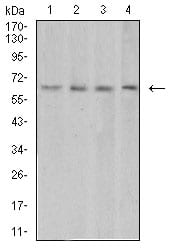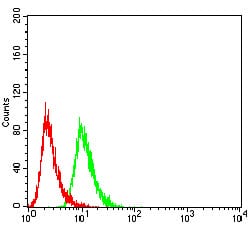


| WB | 咨询技术 | Human,Mouse,Rat |
| IF | 咨询技术 | Human,Mouse,Rat |
| IHC | 咨询技术 | Human,Mouse,Rat |
| ICC | 技术咨询 | Human,Mouse,Rat |
| FCM | 1/200 - 1/400 | Human,Mouse,Rat |
| Elisa | 1/10000 | Human,Mouse,Rat |
| Aliases | VPF; VEGF; MVCD1 |
| Entrez GeneID | 7422 |
| clone | 6G5A10 |
| WB Predicted band size | 27kDa |
| Host/Isotype | Mouse IgG1 |
| Antibody Type | Primary antibody |
| Storage | Store at 4°C short term. Aliquot and store at -20°C long term. Avoid freeze/thaw cycles. |
| Species Reactivity | Human |
| Immunogen | Purified recombinant fragment of human VEGFA (AA: 207-371) expressed in E. Coli. |
| Formulation | Purified antibody in PBS with 0.05% sodium azide |
+ +
以下是3-4篇关于VEGFA抗体的经典文献及其摘要简述:
1. **"VEGF and the quest for tumour angiogenesis factors"** (Ferrara N, et al., 2004)
该综述系统总结了VEGFA在肿瘤血管生成中的核心作用,并讨论了抗VEGFA抗体(如贝伐珠单抗)通过阻断血管内皮生长因子信号通路抑制肿瘤生长的机制。
2. **"Bevacizumab plus Irinotecan in Glioblastoma Multiforme"** (Vredenburgh JJ, et al., 2007)
研究报道了抗VEGFA单抗贝伐珠单抗联合化疗药物治疗复发性胶质母细胞瘤的临床试验结果,显示其可显著减少肿瘤血管生成并延长患者生存期。
3. **"Structure of vascular endothelial growth factor in complex with its receptor"** (Muller YA, et al., 1997)
通过X射线晶体学解析了VEGFA与其受体VEGFR1的结合结构,为设计靶向VEGFA的抗体药物(如阻断结合位点的抗体)提供了结构基础。
4. **"Resistance to anti-VEGF therapy: mechanisms and potential solutions"** (Bergers G & Hanahan D, 2008)
探讨了抗VEGFA抗体治疗肿瘤时产生耐药性的分子机制,并提出联合靶向其他促血管生成因子可能克服耐药性。
Vascular endothelial growth factor A (VEGFA) is a key member of the VEGF family, playing a central role in angiogenesis and vascular permeability. It binds to receptors such as VEGFR-1 and VEGFR-2. activating signaling pathways that promote endothelial cell proliferation, migration, and survival. VEGFA is essential in physiological processes like embryonic development and wound healing, but its overexpression is linked to pathological conditions, including cancer, diabetic retinopathy, and age-related macular degeneration (AMD).
VEGFA antibodies are critical tools for both research and therapeutic applications. In research, they are used to detect and quantify VEGFA expression in tissues or fluids via techniques like Western blot, ELISA, and immunohistochemistry. Therapeutically, monoclonal antibodies (e.g., bevacizumab, ranibizumab) neutralize VEGFA activity, inhibiting abnormal blood vessel growth in cancers or ocular diseases. These antibodies are classified as either monoclonal (high specificity) or polyclonal (detecting multiple epitopes), with monoclonal variants dominating clinical use due to their targeted action.
The development of anti-VEGFA therapies revolutionized treatments for AMD and certain cancers by starving tumors of vascular supply. However, challenges like drug resistance and side effects (e.g., hypertension, impaired wound healing) highlight the need for ongoing research to optimize efficacy and safety. VEGFA antibodies remain a cornerstone in understanding angiogenesis mechanisms and advancing targeted therapies.
×